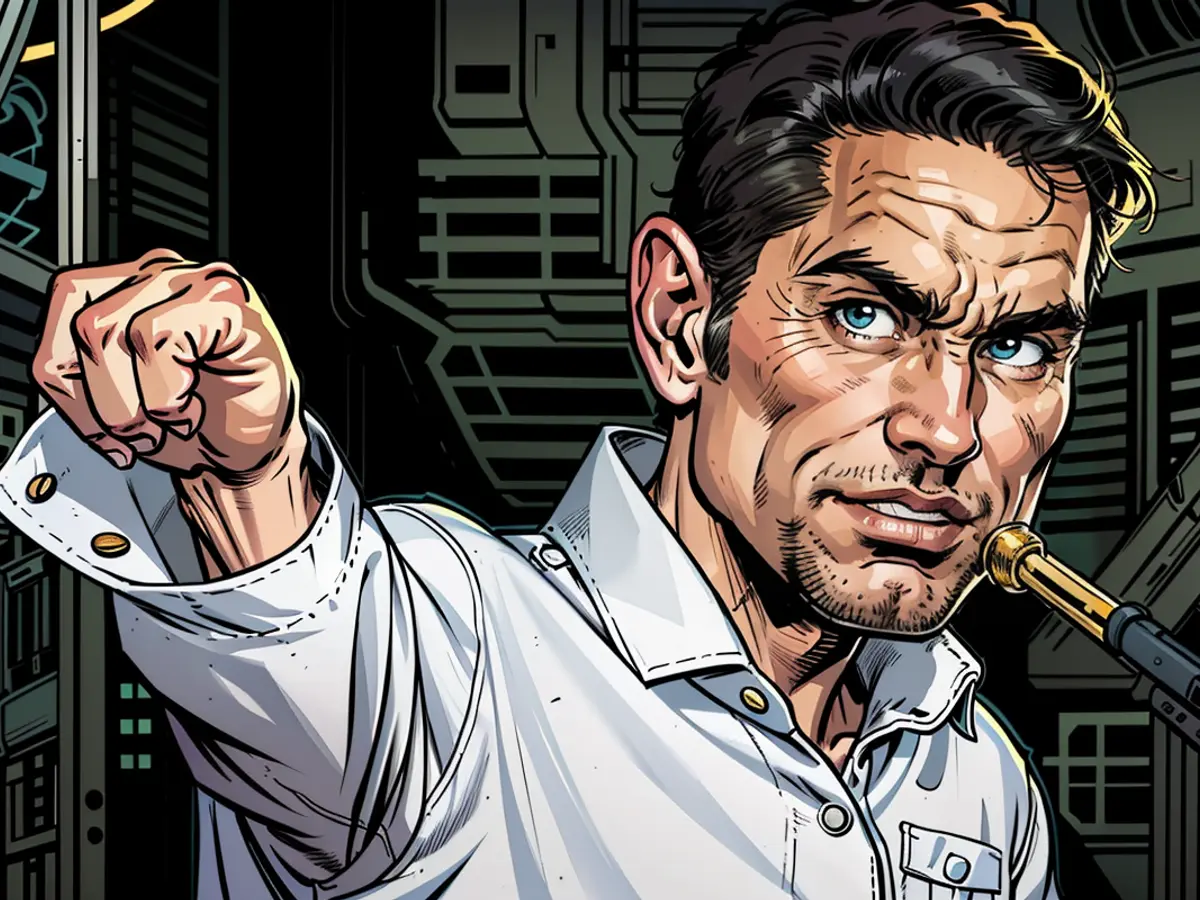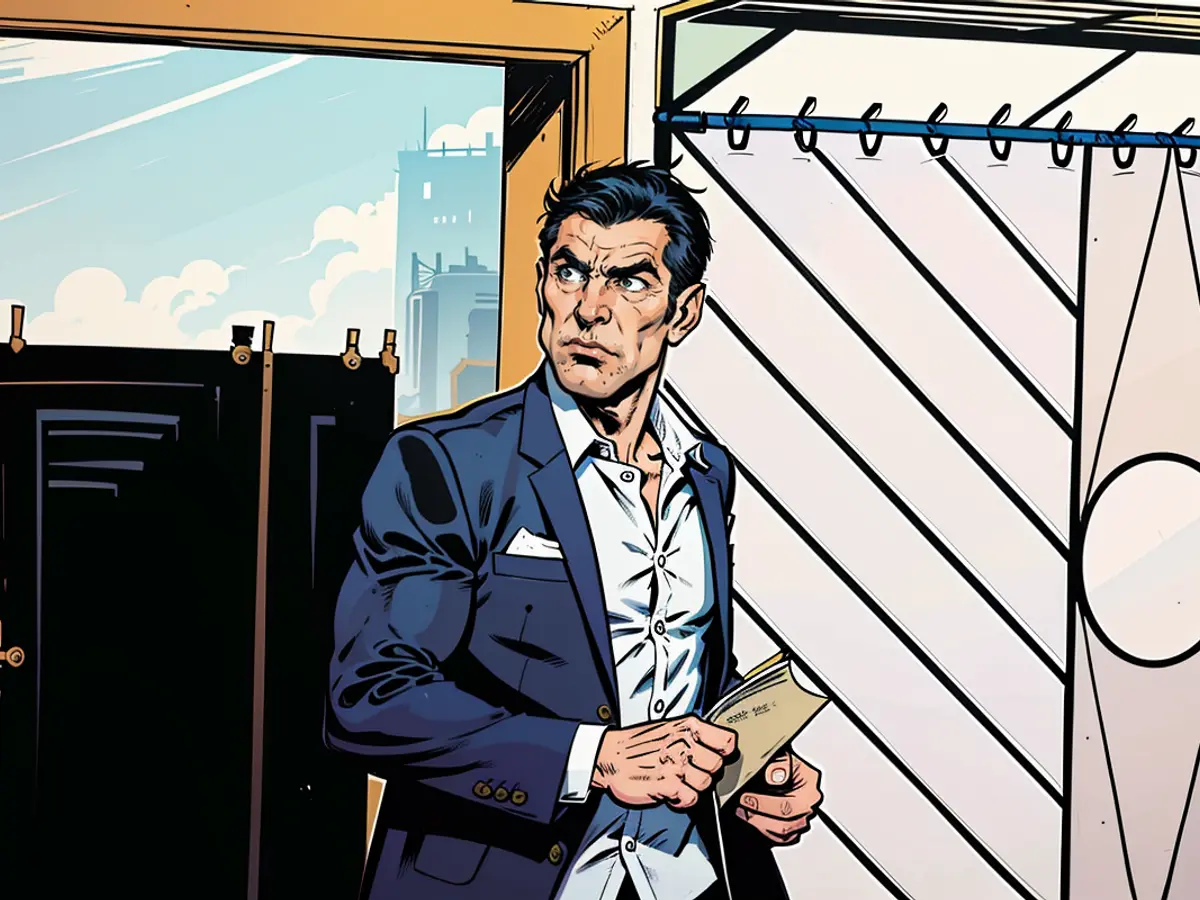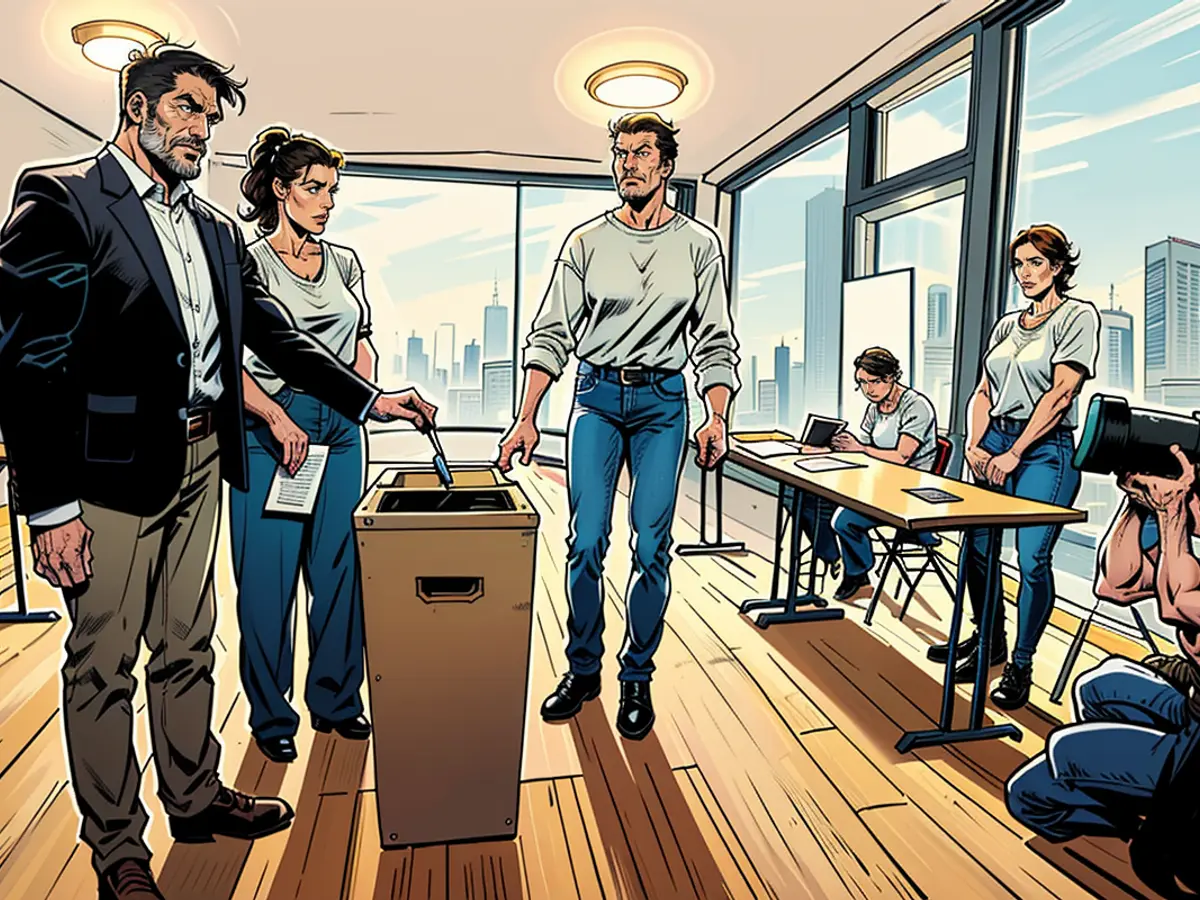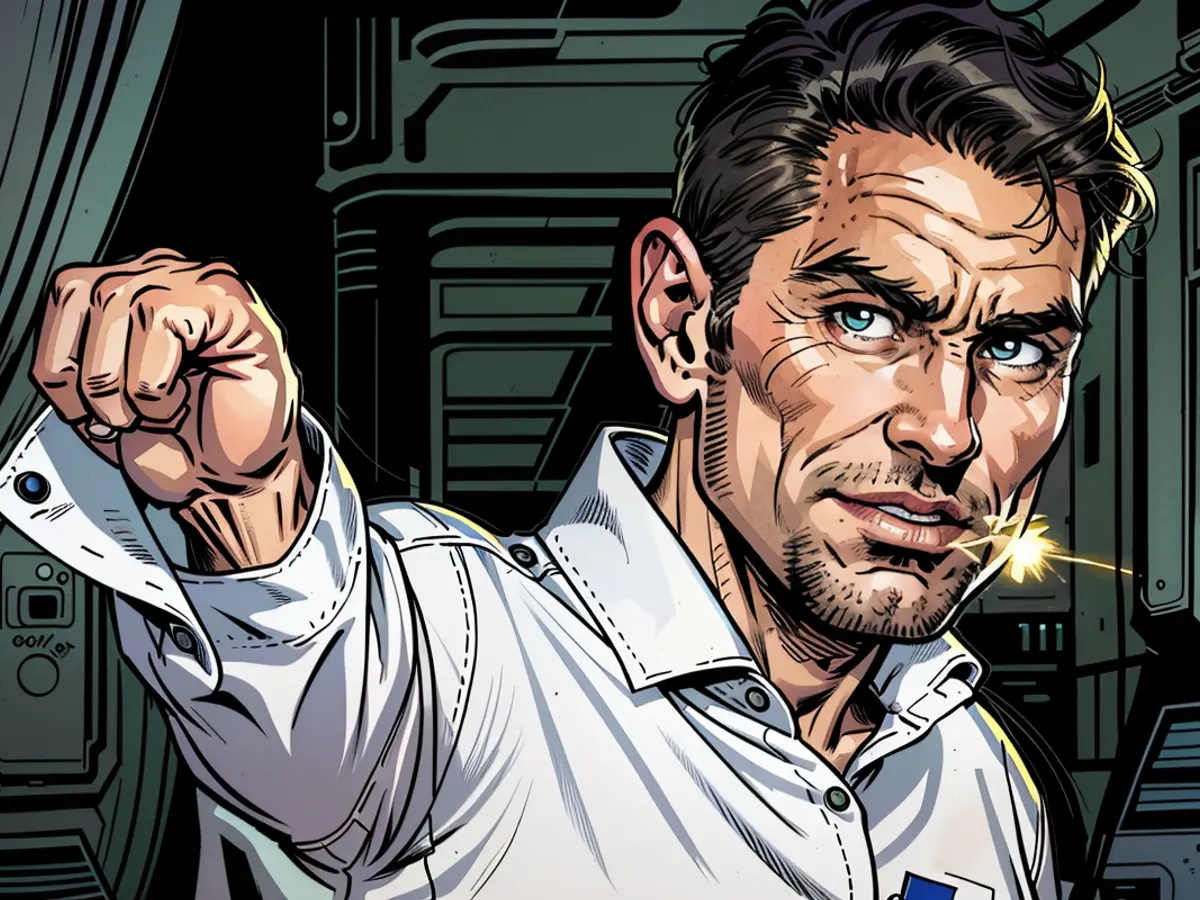At 4:44, an authority forecasts a firewall-related discussion at CDU
03:31 Saxony: Kretschmer and Urban Obtain Direct Seats Saxony's AfD leading figure Jörg Urban has secured a direct seat in the state election. Urban triumphed in the Bautzen 5 constituency with 42.4% of the initial votes, surpassing the CDU candidate Marko Schiemann with 38.1%. Overall, the CDU narrowly won the Saxon state election over the AfD. Minister President Michael Kretschmer maintained his direct seat in the Görlitz 2 constituency with 47.2% of the votes.
02:18 SPD Leader Esken Revises Solingen Statement SPD chairwoman Saskia Esken has corrected her talk show comment that there was not much to learn from the suspected Islamist-driven terrorist attack in Solingen. "That was not a wise and accurate statement," she told Welt TV station on election night. "From this attack and previous ones, as well as potential future attacks, we must realize that we need to take Islamism and the threat of Islamist terrorism more seriously than we have thus far." Esken referred to the federal government's action package in this context.
01:34 Oettinger Ponders Broad Support for Merz as Chancellor Candidate Post the state elections in Saxony and Thuringia, the question of the Union's chancellor candidate for the next federal election is once again under discussion. Former Baden-Württemberg Minister President and EU Commissioner Günther Oettinger advocates for CDU chairman Friedrich Merz and advises swift action. "It would be a mistake if the nomination does not occur within two weeks following the election in Brandenburg," the CDU politician told Tagesspiegel. He went on to say, "I see broad support in my party for Friedrich Merz to be given the opportunity." Similar sentiments were shared by the Union's parliamentary business manager in the Bundestag, Thorsten Frei, and former Federal Interior Minister and CSU politician Horst Seehofer.
01:01 Grimma Mayor Secures Direct Seat for Independent Voters in Saxony The mayor of Grimma, Matthias Berger, has secured a seat in the Saxon state parliament for the Independents in the state election. Berger secured a direct seat in the Leipziger Land 3 constituency, according to data from the state election committee announced overnight. Berger received 36.6% of the votes. The well-known local politician in Saxony served as the flagship candidate for the Independents in the Free State. The party only managed 2.3% of the second votes statewide.
00:29 Political Analyst Predicts LP-CDU-BSW Minority Government in Saxony Leipzig-based political analyst Hendrik Träger considers a minority government of CDU and SPD in Saxony, with the support of the Alliance for Progress and Social Justice (BSW), to be a feasible option. "The BSW would not have to explicitly support the government's bills; it would be enough if BSW members abstained in votes. Then, CDU and SPD could govern with a relative majority," says Träger. "Such arrangements are common in Scandinavian countries, so it's recommended to look beyond Germany's borders."
00:09 Government Formation in Erfurt: Ramelow Offers Voigt Cooperation Thuringia's Minister President Bodo Ramelow has agreed to support CDU state leader Mario Voigt in forming a majority government in the Erfurt state parliament. "We need a functioning state government, even if I won't be part of it," says the Left Party politician to the TV station Phoenix. "I want to support the person who has the mandate from the voters to form a majority government in the democratic spectrum, which is Mr. Voigt in this case." He expressed no opposition to the BSW or the CDU. "I'm fighting against the normalization of fascism. I want to ensure that we don't have a parliamentary blackmail situation where the AfD holds the other parties hostage."
23:29 Höcke Gains Seat in Thuringian Parliament via State List Although the AfD was successful with its direct candidates in 29 out of 44 electoral districts, faction leader Björn Höcke lost to CDU politician Christian Tischner in the Greiz II electoral district. Nevertheless, the AfD's strong second vote result of 32.8% means additional seats in the state parliament compared to direct candidates. Höcke secures a seat in the state parliament via the state list, which he heads. Without a successful AfD candidate waiving their mandate, a successful AfD candidate would likely have had to relinquish their seat for Höcke.
23:13 Preliminary Result: AfD Leads in Thuringia, CDU Considering LP, Green, FDP Partnership In Thuringia, the AfD has received the most votes in a state election for the first time in Germany. The party led by top candidate Björn Höcke achieved a significant increase of 32.8%. However, it will not be able to realize its intention of forming a government, as none of the democratic parties are willing to form a coalition with it. The CDU, as the second-strongest force, will likely have to negotiate with the Left Party to form a stable government coalition. A majority with SPD and BSW falls short by one seat.
22:54 Green Party Leader: Migration and Ukraine Impact Election OutcomesGreen Party leader Omid Nouripour sees the state elections in Saxony and Thuringia primarily affected by the topics of migration and Ukraine. "It's evident that in the final stages, migration and the issue of peace in Ukraine significantly impacted the results," he explained to Phoenix TV. Even though the federal government is tackling these issues, "we hold a disadvantage as this coalition both delivers and undermines itself on the public stage through unnecessary disagreements."

22:39 Thuringia: CDU, BSW, and SPD Lack MajorityIn Thuringia, the previous red-red-green minority coalition under Minister President Ramelow has reached its end. Since no party wishes to form a coalition with the AfD, the most probable option for the government coalition is an unconventional alliance of CDU, BSW, and SPD. At the moment, based on current projections (as of 22:15), this combination is one seat short of a majority in the state parliament. As a result, this alliance would also rely on the Left party.
22:24 CDU's Top Candidate Voigt Fails in ThuringiaCDU's leading candidate Mario Voigt failed to secure the direct mandate in his constituency for the Thuringia state election. Voigt received 37.4 percent of the first votes in the Saale-Holzland district II, placing second behind AfD candidate Wiebke Muhsal, who received 39.2 percent. During the 2019 state election, Voigt succeeded in entering the state parliament as a direct candidate.
22:07 Many Young Voters in Thuringia Prefer AfDMore than a third of young voters in Thuringia opted for the AfD – a party classified as right-wing extremist by the domestic intelligence agency. This is the result of a survey by infratest dimap for ARD. According to the survey, 38 percent of 18- to 24-year-olds in Thuringia voted for the AfD. The Left party received 16 percent, while the CDU garnered 13 percent support. The Greens fared the worst among young voters, with only 6 percent of the votes in this age group.
21:39 Kretschmer Wins Direct Mandate in SaxonySaxony's Minister President Michael Kretschmer won the direct mandate in his constituency of Görlitz II. With 47.2 percent of votes, the head of government holds a clear lead over the AfD candidate, who received 39.4 percent. Kretschmer's party performed weaker in his constituency, garnering only 34.2 percent of the votes, a lower number than the 37.3 percent that the AfD received.
21:21 Thuringia: Ramelow's Ambition Unlikely to Be RealizedThe Left has experienced significant losses in the Thuringia state elections, raising concerns about the future of incumbent Minister-President Bodo Ramelow. One of his aspirations for the night is highly unlikely to become a reality: Ramelow had hoped that the AfD would not secure at least a third of all votes. However, it seems that they may have achieved this, potentially creating a deadlock for decisions requiring a two-thirds majority.
21:13 SPD Remains Supportive Despite Poor ResultsFederal Chancellor Olaf Scholz can still count on the support of his party, the SPD, despite the poor results in the Thuringia and Saxony state elections, according to SPD leader Lars Klingbeil. In an interview with ZDF, Klingbeil stated, "And I, as the federal chairman of the party, expect everyone to now work even harder than they have been." All must contribute to winning back voters, Klingbeil said.
21:02 FDP Deputy Chairman: "Traffic Light Coalition Has Lost Its Legitimacy"Following the poor results of the traffic light parties in the Saxony and Thuringia elections, FDP deputy chairman Wolfgang Kubicki has called for consequences for the federal coalition. "The election result shows: The traffic light coalition has lost its legitimacy," Kubicki wrote on "X". If a significant portion of voters reject it in this way, it must have consequences. People have the impression that "this coalition is harming the country," Kubicki said. The FDP has failed to clear the 5 percent hurdle in both state elections and is currently polling at around 1 percent.
20:41 Thuringia: Höcke Fails to Secure Direct MandateThe district of Greiz II, where AfD faction leader Björn Höcke is running, has been counted: Höcke has failed to secure the majority of votes needed to enter the Thuringia state parliament directly. However, according to ntv information, the party will secure Höcke's seat in the state parliament. Another AfD MP will relinquish their mandate in favor of Höcke.

20:37 Saxony: Left to Join State Parliament Despite 4 Percent SetbackDespite their significant losses, the Left is likely to make it into the Saxony state parliament. Although they did not clear the 5 percent hurdle with second votes, they are currently polling at 4.3 percent based on the latest ZDF projection. However, two Left direct candidates in Leipzig electoral districts are leading with a substantial margin over their competitors. Two direct mandates would be enough to secure the Left at least a few seats in the new state parliament. The two potential winners could also secure a seat for the first places on their party's state list, ensuring that the current coalition of CDU, SPD, and Greens lacks a majority – Minister-President Kretschmer would need the BSW for a governing majority.
20:17 Poll for Saxony: CDU's advantage over AfD slimBased on the recent analysis by ZDF, the CDU in Saxony sustains a microscopic 0.1% advantage over the AfD. As per this data, the Christian Democrats are at 31.5%, while the AfD, categorized as an extreme right-wing group by the German Office for the Protection of the Constitution, stands at 31.4%. Reports suggest that in Thuringia, the AfD has surpassed the CDU in the projections. The Greens are presently at 5.1% in Saxony and raise concerns about their parliamentary representation due to this. The Left struggles with a projected 4.3%, while the SPD is secure in the state parliament with 7.6%.
19:56 Thuringia: Höcke's direct parliamentary seat in jeopardyAFD faction leader Björn Höcke is at risk of missing out on direct entry into the Thuringia parliament in the election. After counting 68 of 74 constituencies, CDU candidate Christian Tischner leads with 42.3% of the votes, while Höcke trails behind with 40.4%. If Tischner wins the majority of votes in Greiz II constituency, Höcke will no longer secure a direct seat. He would then rely on parliamentary representation through the state list, which he currently leads. However, if numerous AfD candidates successfully obtain direct seats, no one will make parliamentary entry via the state list.
19:50 Höcke on AfD's success: "Firewall policy has failed"The AFDP wins the most seats in the Thuringia parliament. Höcke, the party's leading candidate, opined, "The firewall policy has failed." He considered the election result a "historic milestone" and spoke about the forthcoming government formation.
19:42 Ramelow: Left party "devoured"Thuringia's Minister President Bodo Ramelow views two causes for the Left's "devouring": "A CDU that consistently equated the AfD and the Left, always pushing 'exclusionism' in our direction, although it has co-governed the country with us for five years," said the head of government on ntv. As another reason for the erosion of the Left, Ramelow emphasized a "BSW that advertised it would bring the AfD 17% of the votes, yet in reality, they've taken our votes." Nevertheless, Ramelow could celebrate the high voter turnout.
19:26 Nouripour on AfD's success: "My thoughts are with those who are afraid"The AFDP wins over 30% in both Saxony and Thuringia state elections, leaving the Traffic Light parties far behind. Green Party leader Omid Nouripour interprets the AFDP's election result as a "crisis" and a mandate to safeguard democracy together.
19:08 Wagenknecht seeks CDU coalition in Thuringia, potentially with SPDBSW chairwoman Sahra Wagenknecht is aiming for a coalition with the CDU in Thuringia, and potentially also with the SPD. "We very much hope that we will succeed in forming a good government together with the CDU – likely also with the SPD," Wagenknecht stated in ARD. Following five years of minority government, people yearn for a stable majority government that tackles concrete problems like "extreme teaching shortages" in Thuringia, the BSW chairwoman demanded. People, however, also desire a state government that advocates for peace, diplomacy, and opposes the deployment of US missiles in Germany. Wagenknecht dismisses coalitions with the AFDP in Thuringia.
19:02 ZDF projection for Thuringia: AFDP further strengthens its positionA ZDF forecast for the election result in Thuringia shows the AFDP even more successful than initial predictions. According to this, the far-right group gains 33.1% of the votes in the state. The CDU is at 24.3%, Wagenknecht's alliance achieves 15% from scratch. The Left, which currently holds the - popular - state premiership with Bodo Ramelow, suffers a loss of nearly 8 percentage points and is at 11.7%. The SPD obtains 6.6%, while the Greens receive 4% of the votes.

18:56 Göring-Eckardt: AFDP's success is a democratic "shock" in GermanyGreen Party's reactions to the AFDP's success in Thuringia are more pronounced than the party's own election defeat. Katrin Göring-Eckardt, the party’s co-chair, views the far-right's success as a "shock" for democracy in Germany. Party leader Omid Nouripour acknowledges his sorrow over the Greens' failure as "secondary" when compared to the AFDP's rise to the strongest force in a state parliament.
18:48 Kretschmer on Saxony: "We have every reason to celebrate"The incumbent Saxon state premier, Michael Kretschmer, sees the CDU as a cornerstone in the coalition government. "We have every reason to celebrate," Kretschmer declared at his party's election event. "Behind us are five challenging years," during which the people in Saxony relied on the CDU and did not cast a protest vote. "We know how dissatisfied people are with what's happening in Berlin."
18:39 ZDF prediction for Saxony: CDU's lead over AfD decreasesPreliminary ZDF forecasts indicate that the CDU's lead over the AfD in the Saxony state election has narrowed substantially: The CDU is now barely leading the AfD with 31.9 to 31.3 percent of the votes cast. The BSW is at 11.6 percent, the SPD at 7.8. The Greens are on the brink of making it into the state parliament with 5.2 percent, while the Left falls short with 4.5 percent.
18:33 AfD Chair Weidel Suggests Government Participation for AfDAfD federal party leader Alice Weidel is advocating for her party's involvement in the administration in Thuringia and Saxony. "In a normal situation, according to the customs of this country, the strongest party, which is the AfD, should examine this," Weidel stated on ARD, referring to Thuringia. "The voters want the AfD to participate in the government. We attract 30 percent of voters in both federal states, and a stable government is not possible without us."
18:30 SPD Secretary-General: "We Faced the Risk of Being Ousted from the State Parliaments"SPD secretary-general Kevin Kühnert has acknowledged his party's subpar performance in the elections in Thuringia and Saxony. "This is not a night to celebrate for the SPD," he said on ARD. Despite the challenges, his party has been facing for years, "there was a real risk of being ousted from the state parliaments," Kühnert said. "Fighting is worth it, we are needed." Major changes are required, he stated, and mentioned: more openness and engagement with voters. He addressed Chancellor Olaf Scholz: "We need to work together to explain our politics."
18:23 Höcke Praises Thuringia Result as "Historic Victory"AfD parliamentary group leader Björn Höcke hails the Thuringia result as "historic" as the AfD now ranks as the top people's party in the federal state. "The absurd firewall concept must end," Höcke said on MDR. He believes, that only with the AfD will change occur.
18:21 Chrupalla on Thuringia: "Neck and Neck with the CDU"AfD party leader Tino Chrupalla is thrilled with his party's results, pointing to a political transformation in both federal states. The AfD is ready to negotiate with all parties, he stated on ZDF. "In Saxony, we are even with the CDU," Chrupalla said, adding that the AfD aims to make politics for the good of Saxony.
18:17 CDU Secretary-General: No Coalition with AfDCDU secretary-general Carsten Linnemann has dismissed the idea of the CDU establishing coalitions with the AfD in Thuringia or Saxony. "We are extremely clear about this," he said on ARD. The CDU will now form governments from the center of the parliament, he said, and he is confident this will work out. The CDU is the last remaining people's party, the "bulwark," he said, and the traffic light parties have been penalized.

18:13 Projection for Saxony: CDU Slightly in Front of AfD, BSW at 12 Percent, Greens Barely Making the CutAccording to the initial projection for the Saxony state election, the CDU is the victor with 31.5 percent of the votes cast. It barely beats the AfD with 30 percent. The BSW takes the third strongest position with 12 percent, while the SPD continues to be represented in the state parliament with 8.5 percent. The Greens just manage to make it into parliament with 5.5 percent, and the Left falls short with 4 percent, while the FDP is not included in the new parliament.
18:10 Forecast for Thuringia: AfD Ahead of CDU, BSW Makes it into Double DigitsThe first forecast for the Thuringia state election shows the AfD with an expected majority of votes at 30.5 percent, while the CDU lags behind at 24.5 percent. The Left ranks at 12.5 percent, allowing the SPD to secure a spot in the state legislature with 7 percent. The BSW achieves a double-digit result for the first time, and the Greens and the FDP fail to meet the 5 percent threshold.
17:18 Potential loss of parliament seat for Höcke in ThuringiaLeader of the AfD faction in Thuringia, Björn Höcke, might not secure a seat in the upcoming state parliament. His party colleagues could potentially hinder his chances. Many AfD candidates have strong chances of winning directly in their constituencies, but not Höcke. He is fiercely competing with CDU candidate Christian Tischner in Greiz II. If Tischner wins and the AfD receives more direct mandates than their entitled seats from the second vote results, no one, not even the first-place Höcke, can enter through the state list. In such a scenario, the AfD might try to persuade a successful direct candidate to relinquish their state parliament seat, enabling Höcke to secure his mandate.
16:48 Exclusion of media at AfD Thuringia's election partyThere's a likelihood that the Thuringian AfD's election party won't receive media coverage. The party, labeled right-wing extremist by the domestic intelligence agency, attempted to exclude several media outlets from the event. The court thwarted this plan, leading to a ban on all press by the state party. A party spokesperson cited organizational problems, stating that there wasn't enough space at the event location for all the accredited media representatives.
16:29 High percentage of mail-in votes in Saxony's electionFor the "crucial election" for Saxony, which Saxony's CDU Minister President Michael Kretschmer called, nearly a quarter of eligible voters have already cast their ballots by mail. The state election officer predicts 24.6 percent of voters will have voted by mail. The voter turnout at the early afternoon was even slightly higher than in 2019.
15:52 Höcke and Ramelow vote for their respective partiesThuringia's AfD state leader and top candidate, Björn Höcke, voted in the morning, arriving in a Russian-made Lada Niva off-road vehicle. He voted in Bornhagen, Eichsfeld district.
Thuringia's Minister President Bodo Ramelow voted in Erfurt, accompanied by his wife Germana Alberti vom Hofe. He has been leading a minority coalition as the state's head of government since 2014, except for a brief interruption.
15:40 Higher voter turnout than before in ThuringiaIn Thuringia, 44.4 percent of voters had cast their ballots by 2:00 PM. This is an increase of more than two points compared to the election five years ago. The election commissioner has not yet included absentee voters in these figures. In Saxony, turnout was 35.4 percent by early afternoon, slightly higher than in 2019, but the election commissioner expects significantly more absentee voters than in 2019. Polling stations in both states close at 6:00 PM.

15:13 Kretschmer hopes for the entry of traffic light parties into the state parliament
14:40 Key issues in Saxony and Thuringia electionA large survey indicates that nearly a third of people in Saxony and Thuringia want to vote for the AfD in the September 1st elections. The survey provides insights, revealing the primary concerns and issues. Migration is just one of them.
14:13 Höcke leaves polling station promptlyIn the Thuringia state election, AfD's top candidate, Björn Höcke, casts his vote around midday. He spends little time at the Bornhagen polling station and does not speak to journalists on site. Since he has consistently lost to the CDU candidate in his home constituency of Eichsfeld, Höcke had changed his constituency to Greiz. However, he faces a defeat against the CDU there.
13:50 Similar voter turnout in Thuringia to 2019 by middayIn Thuringia, voter turnout is similar to the previous parliamentary election. According to the state election commissioner, around 32 percent of eligible voters had cast their ballots by 12:00. Absentee voters are not included in these figures. In 2019, the voter turnout at this time was 31.2 percent. The election shows a higher interest than in the European and local elections this year. In June, the voter turnout at this time was 24.3 percent.
13:29 High voter turnout expected in SaxonyIn the Saxony state election, a high voter turnout is anticipated. By midday, 25.8 percent of eligible voters had cast their ballots, according to the Statistical State Office in Kamenz. In the 2019 election, the figure was 26.2 percent at the same time. Absentee voters are not yet included in the preliminary figures. It's expected that 24.6 percent of eligible voters will exercise their right to vote by mail, compared to 16.9 percent in 2019. According to the state election commission, the elections are proceeding smoothly in the morning with no known issues.
13:11 von Lucke: Election result could slow down Berlin coalitionThe results of the state elections in Saxony and Thuringia are still pending. If the SPD does not make it into the state parliament, this would "almost already be an earthquake," according to political scientist Albrecht von Lucke in an ntv interview. He analyzes the election and its possible consequences.
12:44 Police investigating threat at polling station
Police in Gera are looking into a threat made at a voting station. A man sporting an AfD t-shirt entered the polling spot early in the day, as reported by a police spokesperson. The polling station supervisor asked the man to take off the shirt because it breached the ban on party promotion within the polling station. The man agreed but warned he'd return, feeling upset about how he was treated upon leaving the polling station premises. Police took his statement and reprimanded him. Furthermore, cops in Erfurt are probing politically charged graffiti ("Höcke is a Nazi") near polling spots as a possible case of vandalism.

12:15 Correctiv Alerts to Recurring Misinformation
Research network Correctiv is sounding alarms about a persistent falsehood that signing the ballot paper secures against ballot fraud. The Electoral Office confirmed to Correctiv that "there's no need to sign the ballot. If the voter signs the ballot paper, it could jeopardize the vote's secrecy, making the entire paper invalid."
11:51 Voigt Wishes for "Stable Majority Relations"
Thuringia's CDU top candidate Mario Voigt also cast his ballot. He expressed hope that "many Thuringians will head to the polls and exercise their right to shape our region's future," he said while voting in Jena. He also wished for "stable majority relations" to drive the state forward.
11:25 Rise in Right-Wing Attacks in Sonneberg
Sonneberg is the first district in Germany governed by an AfD politician. This has led to concerns among active citizens, causing many to quit their jobs. The number of right-wing attacks has also seen a fivefold increase in just one year. Experts tie this to the AfD district administrator.
10:57 Kretschmer Speaks at the Polling Stations
Saxony's Minister President Michael Kretschmer labeled the state parliamentary election "probably the most important election in 34 years." He expressed gratitude to many people who had voted differently in the past but now chose the "strong force in the bourgeois center," the Saxon Union. "This approach will enable us to form a government that serves this land," Kretschmer continued. Recent polls indicate that his CDU is neck-and-neck with the AfD.

10:30 Ramelow: Wagenknecht "Not on the Ballot"
For Thuringia's Minister President Bodo Ramelow, the election day was "a festival of democracy"—even if he might not be re-elected. In an interview with ntv, the Left Party politician explained why he would not recommend a minority government and why he had doubts about the competence of the BSW.
09:59 "Uneasy about This History": Historian Criticizes Election DateHistorian Peter Oliver Loew criticizes the election date for the state elections in Saxony and Thuringia on the 85th anniversary of the German invasion of Poland in 1939. "Someone who decided to hold the elections on September 1st seems to have an uneasy feeling about history," the director of the German Polish Institute told the editorial network Germany (RND). Looking at the AfD, which is classified as "secured right-wing extremist" by the domestic intelligence service in both states, Loew said, "This can lead to unfortunate associations, especially if a party wins in Dresden and Erfurt whose relationship to the Nazi era is unclear."
09:30 "Crucial Elections": All Data for Saxony State ElectionsApproximately 3.3 million eligible voters in Saxony have the opportunity today to determine the political direction of the Dresden state parliament in the future. The CDU could lose its position as the strongest force in the state for the first time since 1990. Saxony's Minister President Michael Kretschmer calls the election "crucial." "This is about everything."
09:05 Kretschmer Accuses Traffic Light Coalition of "Hectic Just Before the Election"It's election day in Saxony, and the question is: Will Minister President Michael Kretschmer extend the CDU's winning streak in the state? In an interview with ntv, he discussed his stance on the refugee debate, the traffic light government, and the Ukraine war.
08:46 All Data for Thuringia ElectionDecision day is here: In the heart of Germany, it's about who will govern the federal state with its approximately 2.1 million inhabitants for the next five years. Will the AfD with lead candidate Björn Höcke become the strongest force in Thuringia?
08:24 How the AfD Could Threaten DemocracyPolls indicate that the AfD is likely to increase its influence in the upcoming elections in Saxony and Thuringia. This is problematic for democratic institutions, as a research group has explained. The rule of law is not as robust as many think.
08:00 Polling Stations Open in Thuringia and SaxonyNew state parliaments are being elected in Thuringia and Saxony today. In the polls, the AfD leads in Thuringia. In Saxony, the CDU of incumbent head of government Michael Kretschmer and the AfD are battling it out. First results are expected when polling stations close at 6 pm. The elections in the two eastern German states are also a mood test for the Traffic Light Coalition in Berlin.

In regard to the present red-red-green alliance led by Minister President Bodo Ramelow (Left) in Thuringia, mainstream polls don't paint a picture of a majority for them. Post-election, a potential government comprising the CDU, Sahra Wagenknecht's BSW, and SPD becomes an opportunity. However, in Saxony, it remains uncertain if the current coalition of CDU, SPD, and Greens continues to hold power. Kretschmer doesn't dismiss the idea of an alliance with the BSW. There's a significant risk for the Left to be ousted from the parliament in Saxony. The same vulnerable position could be shared by the Greens and FDP in Thuringia.
The AfD's leading figure in Saxony, Jörg Urban, was able to secure a direct seat in the state election, while the CDU narrowly won the overall election. In contrast, the AFDP has gained the most seats in the Thuringia parliament, a development that has been described as a "historic milestone" by AfD's faction leader Björn Höcke. The AFDP's success has been interpreted as a "shock" to democracy in Germany by Green Party's co-chair Katrin Göring-Eckardt. The AfD and the AFDP, both classified as right-wing extremist parties by domestic intelligence agencies, have made significant gains in both Saxony and Thuringia state elections.








